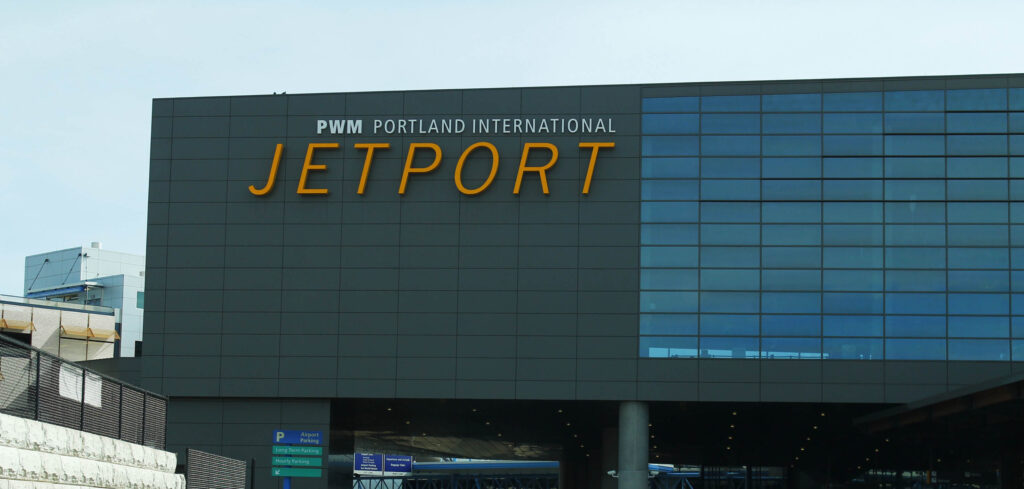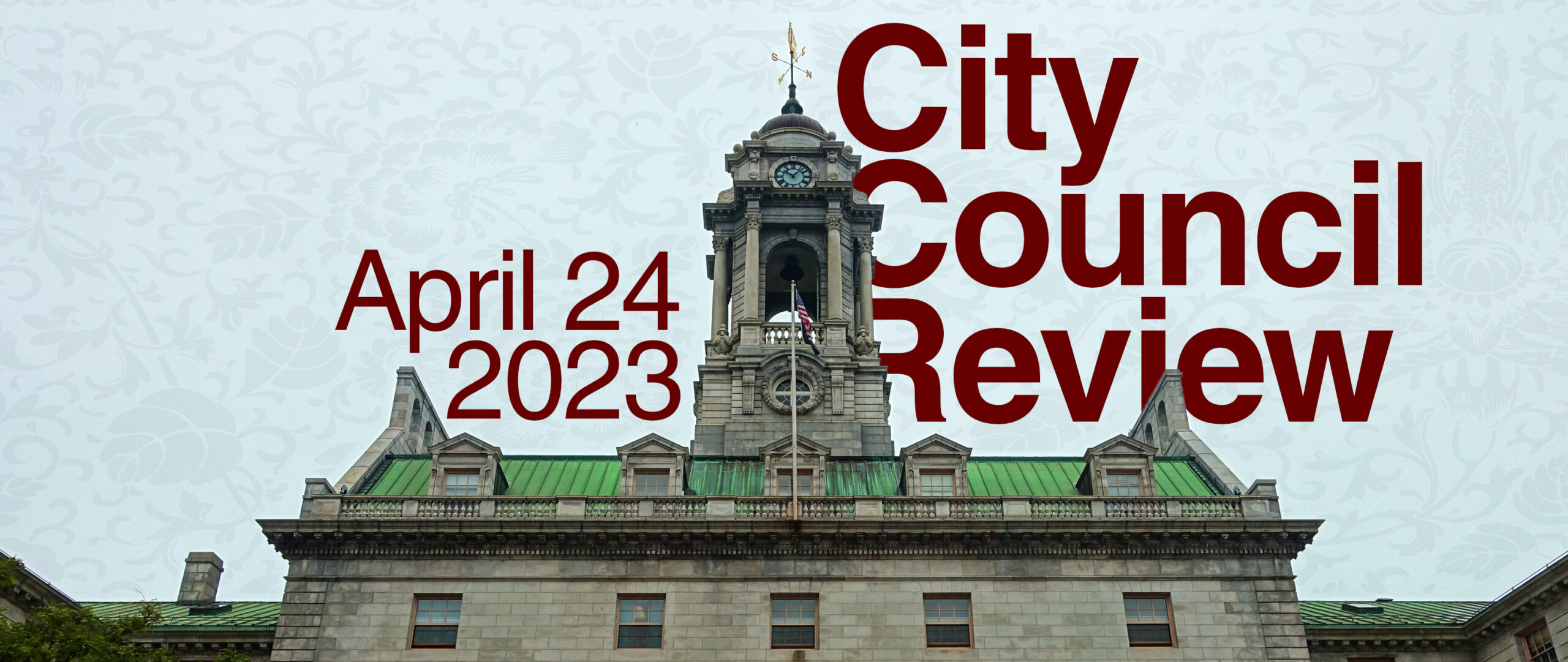After two impassioned meetings in the past month, the City Council meeting on Monday, April 24th was more subdued, but still lengthy. Discussions of public comment rules, budgets, and the clean elections fund dominated the proceedings.
All members of the Council were present, with Councilor Trevorrow joining via Zoom.
General Public Comments
During the 5:00 public comment period, Portland residents raised a number of issues. Steven Scharf of Brackett Street spoke first. Scharf criticized the City Council website redesign, calling it confusing. He also spoke in support of the new restaurant Papi. The restaurant has been ordered by the City to remove its antique doors for lacking historical accuracy. As of this writing, the decision is being re-evaluated.
Two commenters spoke out against the City’s planned clearing of the Bayside trail encampment. Taylor Cray of Preble Street cited a study linking encampment sweeps to increased overdoses, among other adverse effects. Bill Higgins of Homeless Advocacy for All suggested the city set up somewhere else that people in “tent communities” – his preferred term – could safely go for shelter and a shower. “We should be sweeping trash, not people,” said Higgins.
Richard Ward also spoke during public comment, delivering a diatribe of transphobia and falsehoods. His comment inspired two other commenters, Sarah Lynse and TJ Malone, to speak out in support of the LGBTQ+ community in a direct counter.
These exchanges prompted the Council to discuss whether or not anything in the Council rules could prevent hateful comments like Ward’s from being made. “There is some decorum that we have to have,” said Councilor Phillips. Though the Council recognized the importance of free speech, Councilor Fournier added that “there’s a fine line between first amendment protections and emotional abuse.”
In the interest of determining the legal obligations of the council in making rule changes, Mayor Snyder asked Corporation Counsel whether holding the public comment period on non-agenda items was required by law. Corporation Counsel confirmed it was not, but that as long the period was held, it had to be viewpoint neutral. The idea of eliminating the period did not gain traction with the Mayor or Council, and ultimately the Council seemed to agree that clarifying the rules of public comment was the best course of action, though nothing conclusive was decided.
Appointments and Consent Items
Moving into the regularly scheduled agenda, Order 175, Appointing Wardens and Ward Clerks for the 2023-2024 Election Year, passed unanimously. Wardens and ward clerks supervise polling locations throughout the city. Order 176, Appointing Members to Various Boards & Commissions, was postponed to May 1st, due to outstanding requests for more information on certain appointees.
Consent items flagged two upcoming events in the city: the special election on Tuesday, June 13th, with polls open from 7:00am to 8:00pm; and the Shipyard Old Port Half Marathon and 5K on Saturday, June 10th, taking place across the Portland peninsula and Back Cove.
Licenses
Licenses followed. Six businesses were granted new licenses: LB Kitchen and new bar Room for Improvement added outdoor dining; Flatbread added a live music component to their establishment; Hardshore Distilling and Allagash Brewing expanded their spaces; and newcomer Night Mares, a “small, neighborhood-oriented bar,” at 59 Washington Ave, was granted a license.

However, these licenses were not granted without some controversy. In particular, outdoor dining was up for scrutiny by the Council and members of the public. Public commenter Nyalat Biliew criticized the City for allowing businesses to expand into the sidewalk for outdoor dining, but forbidding people from using the sidewalk for shelter. William Higgins also criticized the outdoor dining at Room for Improvement in particular. Located at 41 Wharf Street, the proposed outdoor area would obstruct the entire sidewalk. Though Wharf Street is a pedestrian-only street, delivery trucks still use the road, Higgins pointed out.
Higgins’ comment caught the attention of Councilor Fournier. She emphasized that the cobblestones on Wharf Street make mobility difficult for people using wheelchairs or other aides, and that the brick sidewalk should be accessible for them. While five of the six business licenses passed unanimously, the license for Room for Improvement was met with an 8-1 vote, Fournier opposing.

Budget Items
Next on the agenda were two budget items – first, the School Board budget. The budget, found in full here, was presented by Sarah Lentz, Chair of the School Board, as well as Melea Nalli and Aaron Townsend, Interim Co-Superintendents. According to the speakers, the focus of the Fiscal Year 2024 budget is to fund operational staff in finance and human resources, student facing staff, and support for multilingual learners. The operational staff is a response to the recent payroll challenges that the school district experienced last fall. Resources for multilingual learners – including supporting teachers in becoming ESOL certified – are intended to facilitate the integration of newly-arrived asylum-seeking students in the Portland school system.
The Portland Public Schools will be reaching the end of American Rescue Plan Elementary and Secondary School Emergency Relief (ESSER) in the coming year. ESSER is a COVID-era funding source that is set to expire after this fiscal year. Making the most of the remaining ESSER funding – and finding a sustainable way forward without it – was also a major focus in the FY24 School Board Budget.
The speakers shared that the budget reflected a 5.7% school tax rate increase.
During public comment, Christian MilNeil asked the Council to restore all student-facing positions in wake of the influx of new students. MilNeil’s comment was cut off by Mayor Snyder, who emphasized that Order 187 was simply allowing the Council to receive the budget and refer it to the Finance Committee. Her response to MilNeil curtailed further comments on the content of the budget.
The Finance Committee will meet this Thursday, April 27th, to discuss the school budget; Snyder directed public comments on the budget’s contents to be made there. As it is currently scheduled, the first reading for passing the budget in the Council will be on May 1st, and the second reading and vote will be on May 15th.
The next budget item was the City’s Fiscal Year 2024 budget, presented by Interim City Manager Danielle West and found in full here. Similar to the School Board budget, the City’s budget reflected some concerns about the impending termination of some COVID-era funding. The budget, if passed as it stands, would include a 6.1% tax increase. According to West, much of the budget is dedicated to social services, given that, as West said, “we’re housing about 1,200 people each night.”
A major caveat to the budget, however, is the assumption that the state will grant the city $4.2 million in aid. This has not yet been decided, and West herself called it “a 4.2-million-dollar assumption.” If the state does not grant this funding, the 6.1% increase on taxpayers will jump to 10.4%.
“A 4.2-million-dollar assumption”
Interim City Manager Danielle West
Following West’s presentation, Mayor Snyder spoke, emphasizing that her talking points from the city council budget last year could nearly be repeated verbatim. “We are still in a transition to what will be,” she said, pointing to the lingering ripple effects of COVID and the ongoing arrival of asylum seekers in the city as continuing challenges.
Though public comment was again limited only to the reception and referral of the budget to the Finance Committee, residents still spoke up. Christian MilNeil commented again, urging the Council to provide their thoughts on whether or not the budget is aligned with their stated goals. Steven Scharf requested that the chart showing a $14 million budgetary increase be more widely publicized, and asked for the Finance Committee’s Thursday agenda to be shared.
The City’s budget will be read again on May 15th and June 5th. The order – which, again, only served to receive the budget and refer it to the Finance Committee – passed unanimously.
Communications and Resolutions
One communications item was read by Interim City Manager West, amending golf cart rules which largely pertain to Portland’s islands. The rules cap the number of carts and cart operators within the city.
Resolution 8, Opposing Federal Preemption of Municipal Pesticide Regulations, was presented by Councilor Zarro. Per Zarro, Congress is currently considering a bill that would prohibit municipalities from regulating their own pesticides; the resolution he put forth opposes this practice. It passed unanimously.

Orders followed; Order 170 concerned the acceptance of a federal grant for the Jetport. The order passed unanimously; the money will be used to update and improve infrastructure at the Jetport.
Clean Elections
The next agenda item, Order 171 Amendment to Portland City Code Chapter 9 Re: Clean Elections, took up a significant portion of the evening. Although the first reading of this order occurred at the last meeting, the Council had lingering confusion over its contents, as became evident during the prolonged discussion.
The order was an attempt to implement a Clean Elections Fund as approved by voters last November. A Clean Elections Fund is a financial resource available to candidates running for public office who choose to not take private donations; this is with the goal of diminishing the power of powerful donors over elections. Certain aspects of the Clean Election Fund are still up for debate by the Council; notably, two amendments were put forth Monday night, altering the specifics of the Fund.
The first proposed amendment was sponsored by Councilor Trevorrow, proposing raising the amount the city contributes to the Fund to $500,000 for mayoral election years, with the figure on ‘off years’ being $260,000. The second aspect of Trevorrow’s amendment would enable potential candidates to access funding as early as July 17th, which is significantly sooner than the original proposal, in which qualifying persons cannot access the Fund’s money until August 18th. A third aspect of Trevorrow’s amendment was that, in the event of the fund being depleted prior to all candidates receiving their entitled contributions, the City Council must hold a hearing to consider appropriating more money to the fund.
A point of contention was that persons accessing the funds as early as Trevorrow proposed would not necessarily have qualified to be on the ballot. In that case, a person could, hypothetically, access the funds and then drop out of the race or fail to qualify for the ballot. The proposed solution, per the Trevorrow amendment, is to have those people sign an affidavit to affirm that they would return the money in such an event.
Councilor Dion, consulting with Corporation Counsel, pointed out that an affidavit gives the City very little leverage should someone abscond with the money, highlighting what he perceived to be a flaw in the plan. The money, in such a case, would be “difficult to collect” according to Corporation Counsel.
Others were concerned about the city paying a $500,000 sum, citing the earlier budget discussion where money was an issue.
With this in mind, Mayor Snyder made her own amendment, which would lower the total City contributions to the fund to $351,000 in mayoral years, at least for the first year it was in effect. The sum is based on the number of candidates expected to qualify for this year’s mayoral race. Given that the proposed number on the ballot measure was $260,000, Snyder’s amendment was also an attempt to more closely adhere to this figure.
However, on the other side of the argument, some expressed concern that an underfunded Clean Elections program would discourage people from using the fund, and ultimately the program would never take off. Supporters of the higher sum pointed out that the first year in particular has a significant bearing on the long-term success of the program. State Senator Ben Chipman made an appearance to speak in favor of the Trevorrow amendment, as well as Anna Keller, from Maine Citizens for Public Elections.
A suggested workaround for the figure was to have the Council decide on an annual basis how much of the budget would be dedicated to the fund, allowing the amount to fluctuate based on the elections occurring in a given year.
Ultimately, though, none of the amendments, nor the original proposal, were adopted by the Council. It was evident that several members of the council had serious gaps in their understanding of the proposal. Due to the prolonged confusion and chaos of the discussion, the Council instead voted to postpone the decision until next week’s meeting on May 1st.
The Portland Townsman is planning on publishing an in-depth guide to the Clean Elections Fund once it has been established.
Other Orders
Moving forward with the agenda, the Council heard Order 172, which would rezone the Franklin Towers, an action which would, according to the planning board report, “bring the property into zoning compliance…facilitate renovations to the Franklin Towers building, and allow for future development on the remainder of the site.” Order 173, also related to this topic, would amend the Downtown Height Overlay map to accommodate the rezoning.
Two public comments spoke to opposite sides of this issue. First, Bill Higgins spoke in support of the rezoning and suggested that all building heights should be increased in order to expand affordable housing. Jay York, opposing the Order, felt that the rezoning set a “dangerous precedent” for expanding the downtown area and encroached on residents of the neighborhood like himself.
Both orders passed unanimously without further council discussion.
The remaining orders passed without public comment or discussion – Order 174, another rezoning order, enabling an additional dwelling unit at 22 Park Ave; Order 187, which re-affirmed Portland’s participation in the HOME consortium alongside other towns in Cumberland County, enabling the city to receive HOME funding; Order 188, which temporarily moved the polling place for District 2 from the Expo Center to the Troubh Arena, due to the Expo Center’s current use as a shelter; and finally Order 189, enabling repairs to take place on the Preble Street Extension, a project already funded in the city’s Capital Improvement Plan.
The meeting adjourned with an empty chamber at 8:48pm.


